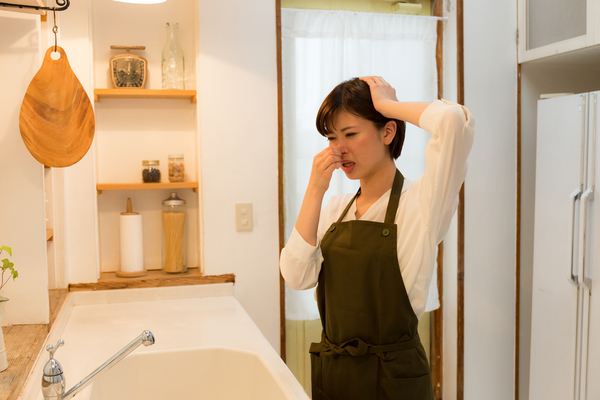Smell is often called humans’ most powerful sense, and good (and bad) smells tell us a lot about the world: what we should eat, even whom we should kiss. When it comes to our homes, if a space smells fresh, that’s a great sign. If the smell is bad? We feel uneasy. But the secret to a nose-friendly space isn’t to spray fragrance on top of yucky stuff: “A clean home should smell like nothing,” says Melissa Maker, the founder of the Clean My Space cleaning company, blog, and YouTube channel. For folks who get overwhelmed by too much fragrance (or who have allergies or asthma), the work may end at neutralizing bad odors. But for those who love a scent, we have ideas for you too.
Deal with moisture.
It’s the number one cause of household odors, says Rachel Hoffman, the author of the (bluntly yet inspirationally named) book Unf*ck Your Habitat: You’re Better Than Your Mess ($16; amazon.com). Consider using a hygrometer to test the humidity level in each room—if you discover a room with humidity above 60 percent, you may want to use a dehumidifier. If needed, you can run more than one dehumidifier, but note that they can use a lot of energy: Start with one and see how it goes.
If you live in a humid climate, avoid wall-to-wall carpeting or rugs, which can trap moisture, especially in areas like the kitchen and bathroom, Hoffman says. Consider keeping moisture-absorbing crystals in smaller areas that get damp, such as bathrooms and some closets ($13, bedbathandbeyond.com). And keep an eye on more micro sources of moisture, such as sponges and towels: Replace sponges at least every one to two weeks, ensure clean towels are fully dry before folding and putting them away, and hang bath mats over the shower rod to help them dry.
Out with the obvious.
Spots like litter boxes, garbage cans, pet beds, and diaper pails are all places that give off funky smells. Duh, you might say, but unfortunately, the more time we spend around these things, the less likely we are to realize that they stink. “It’s called sensory adaptation, and it’s common to all the senses,” says Leslie Stein, PhD, director of science communications at the Monell Chemical Senses Center. This “nose blindness” is actually adaptive, because when regular smells fade into the background and an unfamiliar scent pops up (like smoke), we notice it more. But it can also mean that your stuff smells and you don’t even know it. So it’s important to be proactive: Clean the inside of your garbage can (including the lid, if there is one) at least once a month, Hoffman suggests. Keep a bit of kitty litter at the bottom of the pail to absorb smells. Launder pet beds regularly, and scoop the litter box every day. And if you can, try to use small garbage pails in your home so you’re basically forced to take out the trash more regularly.
Open the fridge.
The first course of action for a funky fridge should be pretty obvious: Toss anything that is past its prime. Hoffman says that some of the worst offenders are condiments—which people tend to think last forever—and leftovers. “They get pushed to the back and forgotten about,” she says. Do an inventory of your fridge at least every month to ensure the contents are fresh.
Then give the interior of your fridge a thorough scrubbing. If you have removable shelves and drawers, pull them out and soak them in hot, soapy water. Wipe down the inside of the structure with a 1-to-1 mixture of hot water and white vinegar with a tiny drop of dish soap. Use a damp cloth to rinse. “Remember to only use cleaners that are food-safe inside your fridge,” says Hoffman. Stay away from bleach, she advises, as it’s difficult to properly dilute and rinse.
Clean soft surfaces.
Carpets, throw pillows, upholstery, bed linens, and window covers are magnets for smells. Once a spill dries or dirt gets wiped away, odor-causing bacteria can still stay behind. In carpets, a missed stain can lead to mold or mildew. Maker recommends having a professional steam-clean your upholstery and carpets once a year. For throw pillows, bed linens, and window covers, check the fabric care labels to see if they can be machine-washed. “But remember there are certain items best left to a pro to ensure the job gets done right,” she says.
The easiest way to avoid smells in a carpet is to quickly attack any spill. Biological stains, like an accident from a pet or a child, should be treated with an enzyme cleaner, such as Seventh Generation Natural Stain Remover Spray ($4; target.com), which breaks down bio messes more quickly. And while carpet shampooing is helpful, the easiest way to stay on top of carpet smells is good ol’ regular maintenance. As you vacuum and spot-treat your carpets more, the less likely they are to smell, Hoffman notes. “Try sprinkling the area with baking powder, let it sit for a few hours, and then vacuum,” says Donna Smallin Kuper, a certified house-cleaning technician and the author of Clear the Clutter, Find Happiness ($10; amazon.com).
—
Photo Credit: polkadot_photo / Shutterstock.com
